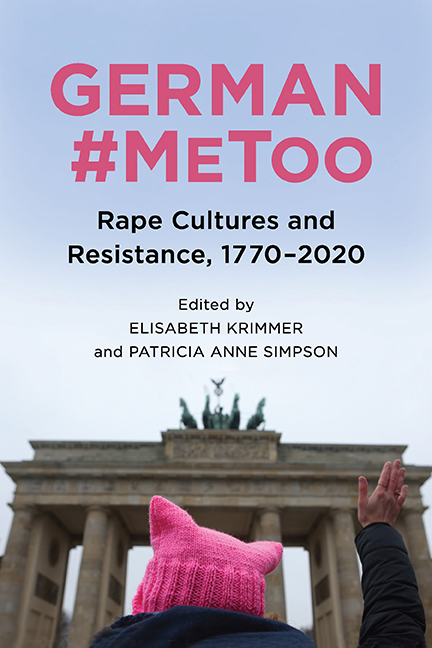3 - “Immaculate” Conception, the “Romance of Rape,” and#MeToo: Kleistian Echoes in Kerstin Hensel and JuliaFranck
Published online by Cambridge University Press: 08 October 2022
Summary
THE INFAMOUS “KLEISTIAN DASH” that marks the murkyencounter of a young woman and her ostensible saviorin Heinrich von Kleist's 1808 novella “Die Marquisevon O…” (1808) conceals a moment of extreme importfor the protagonist and her story. The text'snarrative puzzle obliges the reader to return to thepunctuation mark as the likely scene of themarquise's rape, and it plays with themes of consentand awareness to cast her position of purity indoubt. Kleist's nineteenth-century tale of sexualabuse and punishment continues to resonate today,especially in light of the recent wave of digitalfeminist activism and the #MeToo movement. WhereasKleist's famous dashes often serve to indicate anevent unnarrated or atruth unspoken, the hashtag symbol signals theexplicit intent to communicate. This communicationafforded by the hashtag takes place via alarge-scale digital platform that allows users to“tag” content, linking social media messages andposts under a single thematic umbrella. The #MeToomovement originated in 2006, after activist TaranaBurke used the phrase “Me Too” to empower andamplify the voices of survivors of sexual assault,especially women of color. Following actor AlyssaMilano's revitalization of the term in 2017, itbecame a worldwide phenomenon. At once an emblem ofsolidarity, support, and visibility, the phrase“#MeToo,” like Kleist's dashes, heralds a story thathad remained untold, while endowing survivors withthe power to tell— or not to tell. For Kleist'smarquise, the struggle to articulate a truth sheherself only partially understands is made all themore difficult by the fact that she is simply notbelieved. It is this particular burden—theunnecessary extension of suffering that follows theoriginal assault—that resonates with Kleist'sreaders today and recalls the #MeToo movement'semphasis on the perspectives and experiences ofsurvivors.
Kleist's tale of a mysteriously expectant mother findsan ironic echo in two works of contemporary Germanfiction: Kerstin Hensel's Gipshut (1999; Cap Rock) and JuliaFranck's DieMittagsfrau (2007).
- Type
- Chapter
- Information
- German #MeTooRape Cultures and Resistance, 1770-2020, pp. 83 - 99Publisher: Boydell & BrewerPrint publication year: 2022

